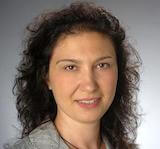In this Research & Technology Forum, held on April 18th, faculty in the Department of Civil and Environmental Engineering (CEE) discussed research programs related to stormwater in Syracuse. The greater Syracuse area has seen many opportunities for research on local stormwater management, largely through the Save the Rain program initiated by Onondaga County in 2010. Designed to reduce combined sewer overflow pollution, the program has led to more than 220 local green infrastructure projects.
Three CEE faculty members presented on their innovative research during this forum. First, Svetoslava Todorova, CEE Professor of Practice, highlighted the long-term hydrological and water quality function of one of the first green roofs in CNY, namely the Syracuse Center of Excellence Green Roof. The roof consistently retains approximately 96% of precipitation inputs, provides substantial improvement in the quality of the water draining from it, and serves as a habitat for birds, bees and rabbits amidst the urban landscape.
Next, CEE Research Professor Cliff Davidson presented the results of research currently underway on the OnCenter Green Roof, located at the Nicholas J. Pirro Convention Center in downtown Syracuse. This research investigates the performance of the green roof in reducing runoff into combined sewers and storing large fractions of stormwater as it evaporates back into the atmosphere. Innovative measurement methods and recently developed computer models are used to quantify the green roof’s current performance and predict possible future changes.
Finally, CEE Assistant Professor Elizabeth Carter discussed data challenges for urban flooding. The regulatory floodplain is well-defined for coastal and riverine flood risk management, but there is no existing technology that allows for real-time spatially continuous monitoring of urban pluvial flooding, which critically limits equitable and effective planning, response, and mitigation. To overcome this critical data challenge, we will discuss emerging trends in urban flood detection from sensor networks and satellite imagery. Specifically, we will discuss an upcoming project funded by SyracuseCoE and the United States Geologic Survey that pilots a low-power sensor network designed to provide real-time alerts of the location and nature of urban flood events, and automatically generate spatially continuous high-water mark maps, using low-power sensor networking, cameras, edge-AI, and photogrammetry. The data generated by this sensor network will be used to validate urban hydrologic models of flood risk, and train algorithms to detect flooding in satellite imagery.
SPEAKERS:

Dr. Liz Carter is an Assistant Professor in the Civil and Environmental Engineering department at Syracuse University. Her research focuses on the development of computational tools that allow global earth observations, like satellite imagery and output from environmental sensor networks, to inform water resources management and response to natural disasters. Prior to SU, she served as the inaugural joint USGS-NASA postdoctoral research fellow, developing robust AI to detect flooding in diverse North American contexts from multiple types of satellite imagery. Current active projects involve automatic rapid evaluation of the stability of coastal engineering interventions using satellite imagery (US ERDC Coastal and Hydraulics Lab), development of a low-power camera-based sensor network to automate flood mapping in urban regions (NY DEC, USGS), and evaluation of how historical flood control infrastructure has redistributed flood risk along socioeconomic gradients in the United States (USGS and NSF).

Dr. Cliff Davidson is the recently retired Thomas C. and Colleen L. Wilmot Professor of Engineering in the Civil and Environmental Engineering Department and the Syracuse Center of Excellence in Environmental and Energy Systems at Syracuse University. He is continuing his research in several areas, including monitoring of air pollutants in Syracuse and performance of green infrastructure for stormwater management. He is Chair of ASCE’s Sustainable Infrastructure Education Committee and was one of the Principal Investigators of the EPA Supersites Program which monitored atmospheric pollutants over many years in Pittsburgh, PA. He served as the AEESP Distinguished Lecturer in 2022-2023.

Dr. Svetoslava Todorova is a Professor of Practice in the Department of Civil and Environmental Engineering at Syracuse University. She is a Board-Certified Environmental Engineering Member under the American Academy of Environmental Engineering and Scientists and an Envision Sustainability Professional. Her area of expertise is in metal biogeochemistry, sustainable infrastructure, and low-cost sensors for environmental monitoring. Todorova is a member of the Open-ended Scientific Group under the UNEP Minamata Convention on Mercury and a member of the UNEP Science-Policy Panel for Sound Management of Waste under the Basel, Rotterdam, Stockholm, and Minamata Conventions.
PRESENTATION:
Slides from this R&T Forum are available below.
Join us at our next event! Sign up to receive SyracuseCoE news and updates.
